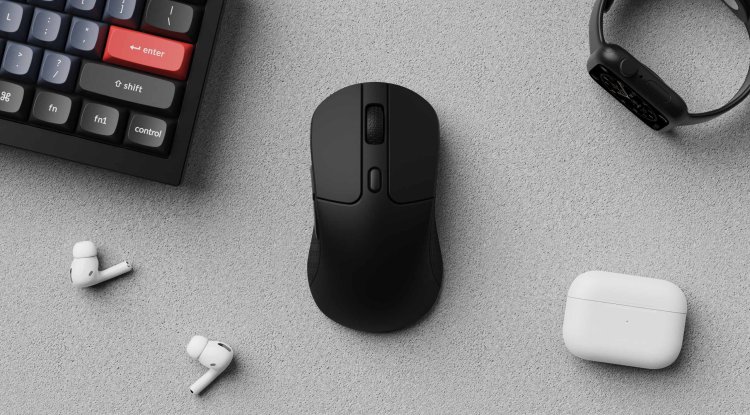Wireless Keyboard: Unleashing the Potential of Convenience and Flexibility
Welcome to our in-depth exploration of wireless keyboards! In this article, we will delve into the advantages and considerations of using a wireless keyboard, shedding light on whether it is a good or bad choice for your computing needs. With the evolution of technology, wireless keyboards have become increasingly popular, offering a new level of convenience and flexibility. Join us as we examine the pros and cons, enabling you to make an informed decision about incorporating a wireless keyboard into your setup.

The Power of Freedom: No More Cable Constraints
One of the most significant advantages of a wireless keyboard is the freedom it provides. Say goodbye to tangled cables and limited range of movement. With a wireless keyboard, you can sit back, relax, and type from a distance, whether it's on your couch, across the room, or even in a different part of your workspace. The absence of cables allows for a clutter-free environment, giving you the flexibility to position yourself in a way that suits your comfort and productivity.
Enhanced Portability and Convenience
Wireless keyboards offer enhanced portability and convenience, making them a great choice for those who are frequently on the move. Their lightweight and compact designs allow for easy transportation, fitting comfortably into laptop bags or backpacks. Whether you're a traveler, a student, or a professional constantly switching between workstations, a wireless keyboard ensures that you have a consistent and familiar typing experience wherever you go.
Easy Setup and Seamless Connectivity
Setting up a wireless keyboard is a breeze. Most models utilize plug-and-play functionality, requiring no complicated installations or drivers. Simply connect the USB receiver to an available port on your computer, and the wireless connection will be established automatically. The pairing process is quick and seamless, ensuring a hassle-free experience. Additionally, some wireless keyboards offer Bluetooth connectivity, allowing you to connect them directly to compatible devices without the need for a USB receiver.
Ergonomics for Comfort and Productivity
Comfort is a crucial factor to consider when choosing a keyboard, especially if you spend extended periods typing. Many wireless keyboards are designed with ergonomics in mind, featuring a comfortable key layout and ergonomic wrist rests. These ergonomic considerations aim to reduce strain on your wrists and promote a more natural typing position, ultimately enhancing your comfort and reducing the risk of repetitive strain injuries (RSIs) such as carpal tunnel syndrome.
Flexible Workspace Arrangements
Wireless keyboards open up possibilities for flexible workspace arrangements. With the freedom of wireless connectivity, you can position your keyboard wherever it's most convenient for you. This flexibility allows for customizable workstation setups, enabling you to optimize your workflow and create a comfortable and productive environment. Whether you prefer a standing desk, a dual-monitor setup, or a minimalist workspace, a wireless keyboard adapts to your needs and preferences.
Considerations: Battery Life and Signal Interference
While wireless keyboards offer numerous benefits, it's important to consider a few potential drawbacks. One such consideration is battery life. Unlike wired keyboards that draw power from the computer, wireless keyboards rely on batteries for operation. It's essential to choose a wireless keyboard with long battery life or consider rechargeable options to avoid frequent battery replacements.
Another factor to be mindful of is signal interference. Wireless keyboards, particularly those utilizing radio frequency (RF) technology, can be susceptible to interference from other wireless devices or physical barriers. However, advancements in wireless technology have mitigated these issues, and most wireless keyboards provide reliable connectivity within a reasonable range.
Compatibility and Operating Systems
Wireless keyboards are compatible with a wide range of devices, including desktop computers, laptops, tablets, and even smart TVs. They are designed to work seamlessly with different operating systems, such as Windows, macOS, and Linux. Before purchasing a wireless keyboard, ensure that it is compatible with your specific device and operating system to guarantee a smooth and enjoyable typing experience.
Also Check MSI MPG X670E Carbon WiFi Motherboard
Conclusion
In conclusion, wireless keyboards offer a host of benefits, revolutionizing the way we interact with our computers. The freedom from cable constraints, enhanced portability, and convenience make wireless keyboards an attractive choice for various users. With easy setup, seamless connectivity, ergonomic designs, and flexible workspace arrangements, they provide a comfortable and productive typing experience.
While considering battery life and potential signal interference, the advantages of wireless keyboards far outweigh any potential drawbacks. Embrace the potential of convenience and flexibility that a wireless keyboard brings, elevating your computing experience to new heights. Say goodbye to cable clutter and limitations, and embrace the freedom and versatility of a wireless keyboard today.
Make the switch and unlock a new level of typing efficiency and comfort with a wireless keyboard. Experience the convenience that wireless technology offers, and take control of your typing experience, wherever you are.





































